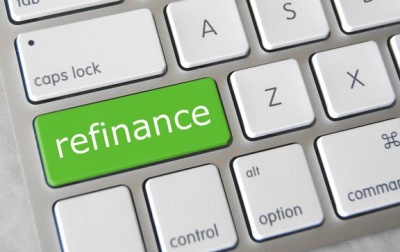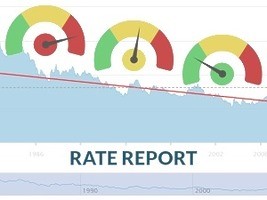
Autumn is in full swing. Kids are back at school, football has started, and the weather is cooling off. In fact, fall is a great time to get a great deal on a new home especially because current market conditions are favorable toward buyers in many areas.
Most home buyers assume buying in the spring or summer gets you the best selection and home shopping opportunities. Experts would disagree. Home buying the in the fall -- especially fall of 2019 -- can yield huge savings on the mortgage rate and home price. It’s wise to start shopping now and take advantage of this window, before the holidays and the cold weather hit.
Here are 3 Reasons why Fall 2019 is the Time to Buy:
Reason #1: Interest Rates are at Historical Lows
Rates are currently at or near three-year lows. And they’re expected to stay low through the autumn. If you’re thinking about buying a home, taking advantage of these low interest rates can be paramount for your purchasing power. Locking in a low interest rate will save you a lot of money later down the road and even in the near future.
Reason #2: Lower Prices
Fall produces urgent sellers. Most sellers list their homes in the spring and summer. If the seller’s house is still sitting on the market in the fall, they are likely willing to lower prices. For buyers, this is a leverage point for you to lock in a good rate and to get a great deal on the purchase price of a new home.
Reason #3: Less Competition
Between September and December there is less home buyers searching for homes. Why? Because many buyers and sellers get their real estate business done before the school year starts. Therefore, come the holidays, there is less home buyers searching. In addition, cooler weather also gives you an edge when looking for a home. Potential buyers favor warmer weather when they don’t have to brave the cold or snowy conditions.
Now is the Time
If you want to capitalize on the fall market, now is the time. We can’t stress enough that today’s low mortgage rates are favorable for buyers. Take advantage and lock in a low rate!
Get Ahead of the Game
Be sure to check out homes for sale, make sure to get pre-approved FIRST, and speak with your local Greenway Loan Officer to discuss your mortgage options. With the right planning and preparation, you could land your desired home for less and be moved in before next year!

Are you feeling overwhelmed by debt? You’re not alone. In fact, many American households are dealing with credit card debt on top of their mortgages, student loans, car loans, medical bills, and the list goes on.
THE GOOD NEWS
For homeowners, the good news is that you may be able to make the debt you have more manageable by refinancing your mortgage. Why? A refinance can help you consolidate your debt by capitalizing on low mortgage interest rates while tapping into your home’s equity.
HOW CAN A REFINANCE HELP PAY OFF DEBT?
Are you familiar with cash-out refinances? We’ve talked about cash-out refinances in the past, but in case you forgot what it is, a cash-out refinance is a type of mortgage refinance that allows homeowners to consolidate debt. This process allows you to borrow money from the equity you have in your home and use that to pay off other debts like credit cards, student loans, etc. Basically, you are paying off any existing balances by transferring them to your mortgage, placing all balances into one debt. This results in only having to make one mortgage payment.
SHOULD YOU REFINANCE YOUR MORTGAGE TO CONSOLIDATE DEBT?
Reach out to one of our local loan experts to discuss your options. When determining if a cash-out refi is best for you, here are some questions to ask yourself:
1. Do I have enough equity?
You will need to have enough equity to borrow while keeping some remaining in the home. The amount of equity you leave in your home after a refinance is important because it affects your loan-to-value (LTV).
An LTV determines if you need Private Mortgage Insurance (PMI), which can cost hundreds on your monthly mortgage payment. Keep in mind that if your LTV is higher than 80%, you may be required to pay this insurance. To avoid paying for private mortgage insurance, your LTV after you refinance needs to be at 80% or lower. Here’s an example of how you can easily calculate your LTV before you refinance:
Let’s say your home is worth $500,000 and your loan balance is $250,000. Your LTV would be 50%.
-
Property Value = $500,000
-
Loan balance = $250,000
-
250,000/500,000 = 0.50
To figure out how much your LTV would be with a cash-out refinance, simply add the amount of equity you want to borrow to your current loan balance, then divide that by the appraised value of your property. For instance, say you want to borrow 10,000 to pay off your credit card debt, your new loan balance would be $260,000 and your new LTV after your cash-out refinance would be 52%.
-
Property Value = $500,000
-
Loan Balance = $250,000
-
Cash-out amount borrowed = $10,000
-
New loan balance - $260,000
-
260,000/500,000 = 0.52
With a 52% LTV, you could do a cash-out refinance with enough equity leftover to avoid PMI.
2. Can I afford a higher monthly mortgage payment?
Refinancing does not get rid of debt. However, it transfers it over to another debt also known as your mortgage. When you refinance your mortgage, your balance increases by the amount of equity you borrowed. It’s important to understand that no matter how much debt you transfer, increasing your mortgage balance will in turn increase your monthly mortgage payment.
3. Does the cost of the mortgage make sense compared to other options?
Do you remember paying closing costs on your original mortgage? Well, you will also need to pay these costs on a mortgage refinance. There may be some additional costs included as well – speak with your loan officer for more details.
If you think a mortgage refinance is right for you, reach out to one of our local loan experts. We will review your current mortgage and see what the next best step is. If you’re ready to get the process started, get a free pre-approval today. This process takes less than 5 minutes and you can do it from your phone! Click here. If you prefer to speak with one of our Loan Officers, we would be happy to help! 908-489-4658.
We know this is a big financial decision, and we want to make sure you make the best decision possible.
The media says mortgage rates are near “historical lows.”
.gif)
To put that in perspective, check out the graph. You’ll see that with rates now under 4%, they're less than half of the long-term average of 8%.
The combination of low mortgage rates and rising prices in most areas can create great opportunities. At the least, this is a great time to ask questions and assess potentials.
Your local loan experts at Greenway Mortgage are happy to talk with you about the range of possibilities—refinancing to a lower payment, accessing cash from the equity in your home, or perhaps even moving on to a new home.
When you're ready for an honest discussion about what might be right for you, even if that’s staying with the loan you have, we will be happy to assist. Please reach out!
- For all the details about Automation and Big data click here. - 
Our relationship doesn't end at closing. I want you to be a client for life!
I leverage big data to continuously monitor your loan account. My system automatically conducts a loan review two times per year. It monitors property value, equity position, and interest rate. It will also auto-trigger notifications when you can eliminate PMI (private mortgage insurance) and possibly lower your rate and/or payment.
Thank you for taking a few minutes to learn more about how I leverage automation and big data to make the mortgage process faster and more efficient.
And remember, it all starts with My Mobile Mortgage App. Download it today.
Did you miss Part 1 and Part 2 of this blog series?
- Part 1: How Automation and Big Data Make the Mortgage Process More Efficient
- Part 2: Your Loan in Motion with Big Data Loan Approval System
You can learn more about Automation and Big data by clicking here.

I was thinking of purchasing a home or property, but I’m worried values will fall.
I worry that my income will shrink or I’ll even lose my job.
If I borrow against the equity in my home, I might end up owing more than my home is worth.


.jpg)


.jpg)
.png)

